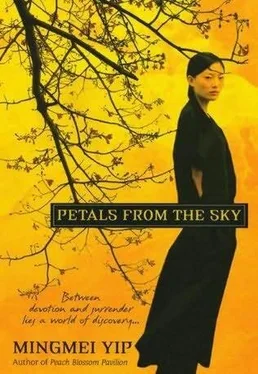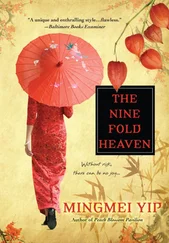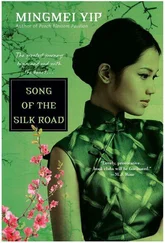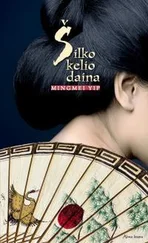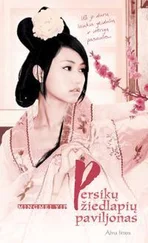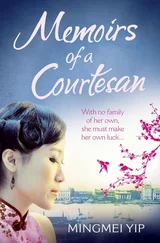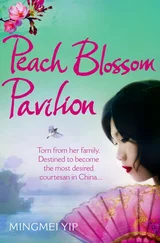“I was just thinking the same.”
So I asked the driver to make a detour. He made a U-turn onto a meandering dirt road and followed it for another ten minutes, frequently expressing doubt that we’d find anything. Finally, we spotted a flight of narrow stone steps and he pulled up and let us out.
“Miss, I’m afraid you two have to climb your way up. I’ll wait here.”
Slowly Michael and I made our tortuous ascent of the steep, heaven-bound, zigzagging stairs. The day was getting hot, but luckily, heavy canopies of foliage shaded us from the sun. It took us ten minutes before we finally emerged onto level ground, sweating and panting.
Michael smiled, wiping his forehead with a handkerchief. “We made it, Meng Ning.”
Dressed in running shoes, jeans, and a pale green T-shirt, Michael looked relaxed and happy, blending perfectly with the tall bamboo and its dappled, dark green shadow.
We walked along the level path until we reached a moon-shaped gate made of old gray stones, the lower portion overgrown with plants. On top of the arched structure were large Chinese characters in seal script: Universe of Empty Nature. Once through the round gate, between patches of leaves we could spy fragments of a distant temple with upturned eaves. Inhaling the fragrance of unknown blossoms, I felt far from the dusty world, as if we had just found the fabled Peach Blossom Garden.
Peach Blossom Garden, a lost Chinese utopia, was the subject of a famous poem by the Six Dynasties poet Tao Yuanming, who, at forty-five, had become disgusted by his official life and decided to become a farmer. Thereafter, he enjoyed a simple life: he tended his garden, read, drank wine when he had a few coins to pay for it, and wrote poetry.
Tao Yuanming told of a fisherman from Wuling who used to boat along a nearby river. One day, forgetful of how far he had gone, he spied a grove of blossoming peach trees. He beached his boat and entered the garden. At once he found himself inside a secluded world forgotten by time. The small village was inhabited by farm families living simple, honest lives, unaware even of the passing of the dynasties over the centuries.
Tao’s poem was immensely popular over the ensuing centuries, for it spoke of a paradise where people unselfconsciously appreciated the simple joys of spring: blooming flowers, singing birds, and the clouds passing over distant peaks. The Confucian moral rules were unnecessary because the people were naturally good. All lived for more than one hundred years because of their closeness to nature and freedom from stress. As the day grew late, the fisherman returned home, intending to revisit. Yet, though he knew the river well and searched earnestly, he could never again find the Peach Blossom Garden.
We approached the temple. Red paint was peeling off the wooden pillars supporting the bluish-green roof. Beside the entrance ancient pine trees towered like guardian gods.
“Michael, come take a look,” I said.
We hurried up to the temple and peeked through the wooden-latticed windows. An antique bronze Buddha, unsurprised by my intrusion, stared back at me, smiling compassionately.
“Let’s go in.” He took my hand and we stepped inside the courtyard.
The first thing we saw was a plum tree with pink blossoms. As we looked up at the petals, Michael started to recite, “‘In the past, we frequently met in the emperor’s house. Many times, I heard you sing in the grand hall. Now south of the river, I meet you in this season of falling petals.’”
It felt strange to hear Du Fu’s famous poem from Michael’s mouth. I sighed, feeling lost in the familiar dream of a past life where we, as lovers, had lain down in a petal-strewn, sweet-scented garden, singing and reciting poetry.
The temple floor was well swept, leaving an impression of venerable age, but not decay. There were also inscribed stone tablets. I did my best to translate to Michael those I thought would interest him.
One told the story of a young man whose beloved, a village lass, had married someone else. Having recognized the delusive nature of worldly desire, he had taken refuge in this very temple.
After my translation, Michael shook his head. “That’s not a good reason to be a monk-”
Just then a gentle voice breathed at our back. “Honorable visitors, may I be of service?”
We turned and saw a muscular young monk. He was clad in a gray top and pants, with a white sash tied around his middle, perhaps a touch of vanity to accentuate his lean waist. His manner seemed refined, his bald head glowed, and intelligence emanated from his almond eyes.
Placing our hands in the prayer gesture, Michael and I bowed respectfully. Then I said, “Shifu, we’ve just been looking around and appreciating the temple.”
With equal respect, the monk bowed back with his hands together. “Thanks, you are welcome here,” he said. “I apologize that I did not meet you at the gate. It has been a long time since we have had visitors. Stay as long as you like. Please join us for tea?”
“Thank you, Shifu, we’d love to,” I said, then translated our conversation to Michael, whose face lit up instantly.
We followed the young monk through another moon gate. He pointed out a stone lion, an enormous bronze incense burner, and a tower with a green encrusted bell, so ancient it looked as if it had been last struck a thousand years ago.
Then, when we passed a small pond laced with weeds, the monk stopped and pointed to what I’d thought was a stone ornament covered with moss. “My honorable guests, I would like you to meet Perfect Merit, our enlightened tortoise. We believe he is the direct descendent of that tortoise who lived on the bed of the Eastern Sea and carried the Five Divine Mountains on his back.”
Before I could express my amazement, he went on. “Perfect Merit has witnessed the vicissitudes of many lives and is older than the three of us together.”
I translated this to Michael, and he exclaimed, “Is that so? How old-one hundred?”
I told the monk. He raised three fingers and smiled proudly. “No, three.”
I asked, “Can we touch it?”
“Sure. He’s achieved wisdom and compassion.”
Michael and I stooped to pat the tortoise’s shell, and the spiritual creature, instead of shrinking his head, cast us a slow soulful glance, as if saying, “Please leave me alone, you deluded mortals with your worldly entanglements!”
As I drank in the beauty of the place and inhaled its mingled fragrances, a sense of purity and freedom rose inside me.
The young monk led us from the sunlight into a cool, dim hall. Following him, we crossed another threshold into a sparse interior. The wooden furniture was plain and worn smooth. On one wall hung an ink painting of Bodhidharma, the founder of Zen, with an expression warning that he had no time for nonsense.
The young monk excused himself into an adjacent room.
The feeling here was quite special; there’d been nothing like it in the large cave temple that I’d documented with Enlightened to Emptiness. It was as if I’d somehow found myself in one of the remote mountain temples in a Song dynasty landscape.
Michael’s thoughts were echoing mine. “When I first looked at Chinese art, I imagined myself in a temple like this. I never thought it would really happen.” Smiling, he asked, “You think we’ll be able to find our way back?”
“Who cares?” I smiled. Perhaps, like me, he hoped that somehow we could live together in this simple place far from the confusion of the real world. But of course, a monastery would be the last place I could live with Michael!
A pause, then I went up to take a close look at another hanging scroll. The ink pale, the style effortless, it portrayed a dozen elegantly crisscrossing plum blossoms; in between their branches a big moon peeked through. The poem to its left read:
Читать дальше
